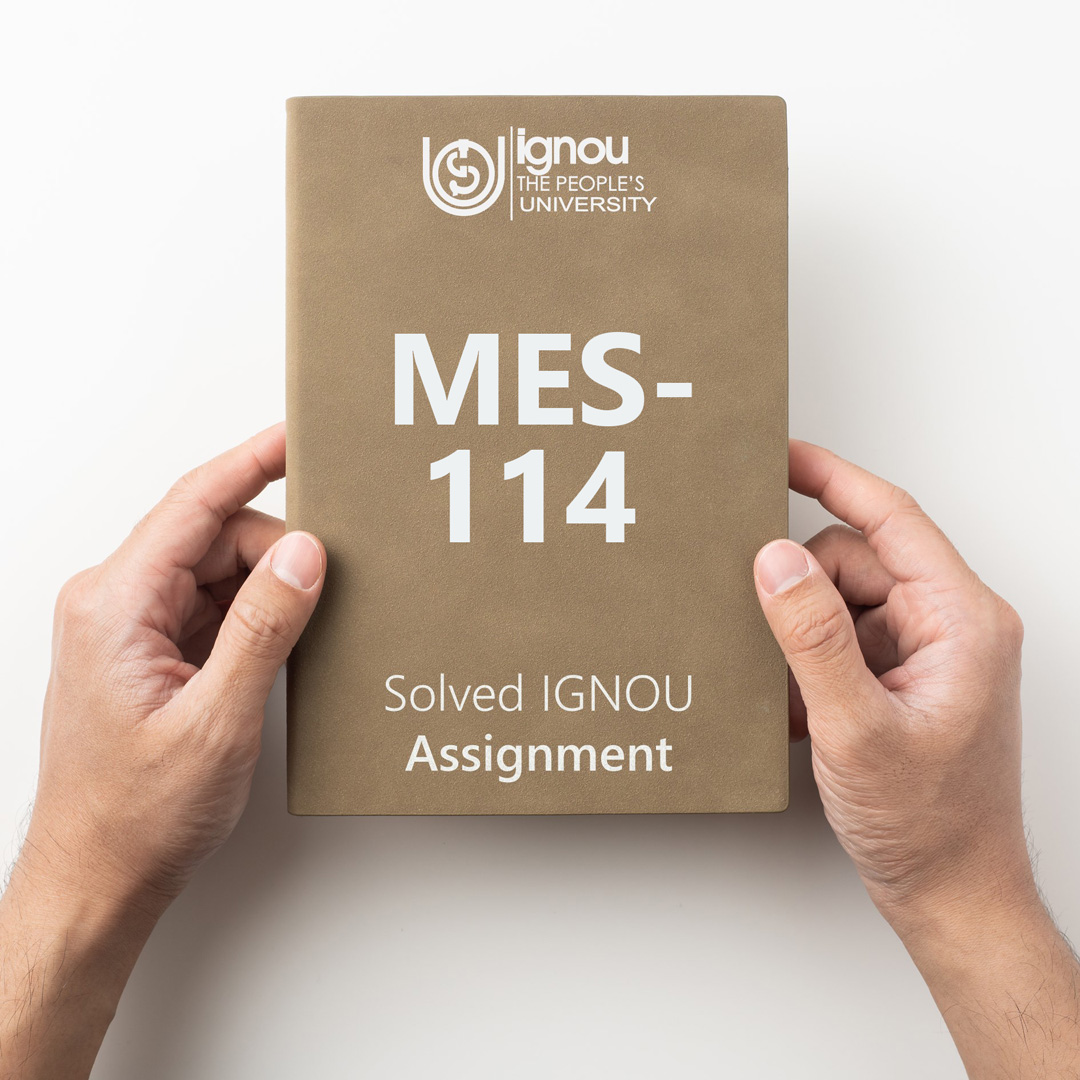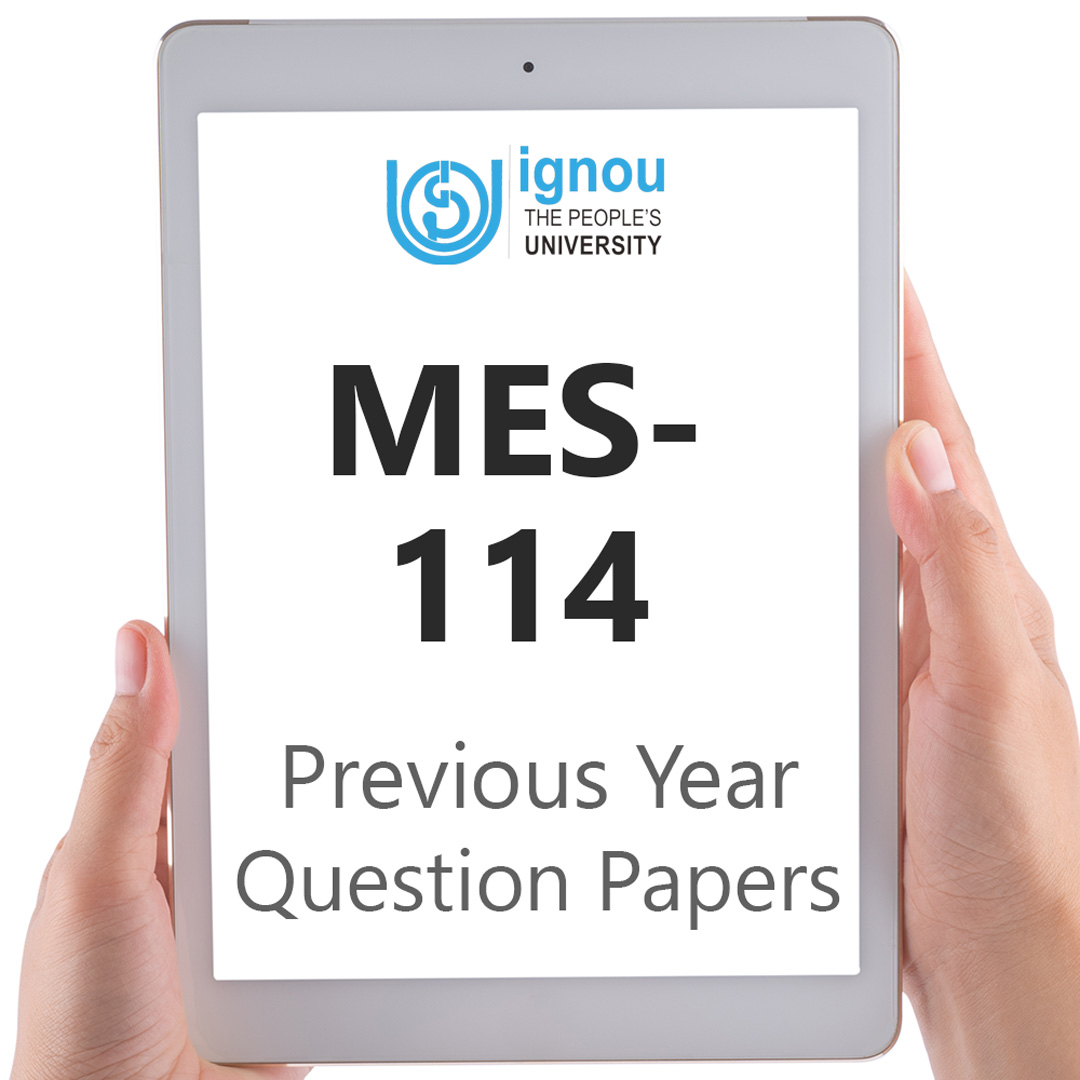If you are looking for MES-114 IGNOU Solved Assignment solution for the subject Management of Distance Education, you have come to the right place. MES-114 solution on this page applies to 2023 session students studying in MAEDU courses of IGNOU.
MES-114 Solved Assignment Solution by Gyaniversity
Assignment Code: MES-114/TMA/2023
Course Code: MES-114
Assignment Name: Management of Distance Education
Year: 2023
Verification Status: Verified by Professor
a) Discuss various considerations that need to be taken into account while planning the establishment of a distance education institution. (500 words)
Ans) Establishing a distance education institution can be a complex and challenging process. Several considerations need to be taken into account while planning the establishment of a distance education institution. The considerations that need to be taken into account while planning the establishment of a distance education institution are:
Vision and Mission: The first consideration while planning the establishment of a distance education institution is to have a clear vision and mission statement. The vision and mission statement should define the institution's objectives, goals, and values. The vision and mission statement will guide the institution's development and help in creating a strategic plan.
Legal Framework: The second consideration is to understand the legal framework that governs distance education in the country. The distance education institution must comply with the regulatory requirements of the country. It is important to understand the regulatory requirements for admission, program delivery, and assessment.
Market Demand: The third consideration is to identify the market demand for distance education programs. The institution must conduct a thorough analysis of the current job market, industry trends, and the demand for specific skills and knowledge. The market analysis will help in identifying the programs that the institution should offer.
Infrastructure: The fourth consideration is to have a robust infrastructure for the delivery of distance education programs. The institution must have a reliable internet connection, digital learning platforms, and online assessment tools. The institution must also have a physical infrastructure, including a library, classrooms, and administrative offices.
Faculty Development: The fifth consideration is to have a faculty development plan. The faculty members must be trained in distance education pedagogy, technology-enabled teaching, and assessment. The faculty members must be proficient in using digital learning platforms and online assessment tools.
Curriculum Development: The sixth consideration is to develop a curriculum that is relevant, effective, and engaging. The curriculum should be designed to meet the learning outcomes and program objectives. The curriculum should be reviewed periodically and updated to meet the changing industry trends.
Assessment and Evaluation: The seventh consideration is to develop a robust assessment and evaluation system. The assessment and evaluation system should be designed to measure the learning outcomes and program objectives. The assessment and evaluation system should be fair, transparent, and reliable.
Student Support Services: The eighth consideration is to have robust student support services. The institution must provide academic and administrative support to the students. The institution must have a counselling center, a library, and a student feedback system.
Quality Assurance: The ninth consideration is to have a quality assurance system in place. The institution must have a mechanism to monitor and evaluate the quality of the distance education programs. The quality assurance system should ensure that the institution maintains high standards of academic excellence.
Financial Sustainability: The tenth consideration is to have a sustainable financial model. The institution must have a revenue model that can sustain the institution's operations. The institution must also have a cost management system that can optimize the resources.
Establishing a distance education institution requires careful planning and consideration of several factors. The considerations discussed above, including having a clear vision and mission, understanding the legal framework, identifying market demand, having a robust infrastructure, developing faculty, curriculum, and assessment systems, providing student support services, ensuring quality assurance, and having a sustainable financial model, are essential for the success of the distance education institution. The institution must continuously review and update these considerations to ensure that the institution remains relevant and effective in meeting the changing demands of the learners.
b) Discuss the factors that affect the change process in a distance education institution. (500 words)
Ans) The factors that affect the change process in a distance education institution are:
Change Process: the change process itself can significantly affect the success of the change initiative. The change process involves several stages, including awareness, planning, implementation, and evaluation. Each of these stages requires careful planning, communication, and stakeholder involvement to ensure success. A well-designed change plan that outlines the desired outcomes, resources required, and timeline can increase the chances of success. Additionally, effective leadership support, stakeholder involvement, and communication strategies can help to build buy-in and support for the change initiative.
Radiant Causes: radiant causes are external factors that trigger the need for change in a distance education institution. These may include technological advancements, changes in government policies, shifting market demands, and competition from other institutions. Radiant causes are often beyond the control of the institution, and they require a proactive response to stay relevant. For example, the Covid-19 pandemic has significantly impacted distance education institutions and has forced them to adapt their delivery methods to meet the needs of their students. As such, distance education institutions need to be aware of the radiant causes that may impact them and take proactive steps to adapt.
Psychological Causes: psychological causes refer to internal factors that influence the readiness of individuals to embrace change in a distance education institution. These may include fear of the unknown, resistance to change, lack of motivation, and low morale. Psychological causes can be addressed through effective change management strategies, including communication, training, and support. Effective communication can help to build trust and understanding among stakeholders and create a sense of urgency for the change initiative. Additionally, training and support can help individuals to build the skills and confidence needed to embrace the change.
Sociological Causes: sociological causes refer to the cultural and social norms that shape the behaviour and attitudes of individuals in a distance education institution. These may include the institutional culture, leadership style, and stakeholder engagement. Sociological causes can be addressed through a comprehensive change management plan that involves all stakeholders and addresses their concerns and expectations. For example, if an institution has a culture that values tradition and stability, it may be challenging to implement change initiatives. However, if the change management plan involves stakeholders in the decision-making process and addresses their concerns, it can increase the chances of success.
In conclusion, the success of the change process in a distance education institution depends on several factors. These include the quality of the change plan, leadership support, stakeholder involvement, communication strategies, external factors such as technology, and internal factors such as fear of change or the institutional culture. Effective change management strategies that address these factors can help to ensure a smooth transition to the desired state of the institution. Distance education institutions need to be proactive and adaptable to stay relevant in the changing world and meet the needs of their students. Therefore, understanding the factors that affect the change process is critical for their success.
c) Describe the process of development and delivery of a course followed in Indira Gandhi National Open University (IGNOU). (500 words)
Ans) Indira Gandhi National Open University (IGNOU) is one of the largest open universities in the world, with over 4 million students enrolled in various programs. IGNOU offers a wide range of undergraduate, postgraduate, diploma, and certificate courses across various disciplines. The process of developing and delivering a course in IGNOU is a rigorous and structured process that involves several stages. In this essay, we will describe the process of development and delivery of a course in IGNOU.
Course Development Process
Need Assessment: The course development process begins with the identification of the need for a new course. The IGNOU academic team conducts a thorough analysis of the current job market and identifies the skills and knowledge required for the workforce. The team also takes into account the feedback from the industry, students, and faculty members to understand the need for a new course.
Curriculum Design: Once the need for a new course is identified, the curriculum design team develops a course outline. The course outline includes the course objectives, learning outcomes, course structure, syllabus, and assessment methods. The team also determines the course credits, prerequisites, and eligibility criteria.
Resource Material Development: After the course outline is finalized, the resource material development team starts developing the course material. The course material includes textbooks, study guides, audio-visual aids, and other learning resources. The material is developed in consultation with subject matter experts and reviewed by the academic team before finalizing.
Pilot Testing: Once the course material is developed, a pilot testing is conducted to test the effectiveness of the course material. The pilot testing involves a small group of students who provide feedback on the course material's effectiveness and relevance.
Final Review: Based on the feedback received during the pilot testing, the course material is reviewed and revised. The final review ensures that the course material is aligned with the course objectives and learning outcomes.
Course Delivery Process
Admission: The admission process begins once the course is developed and reviewed. Students can apply for the course online or through a regional center. The admission process includes eligibility verification and fee payment.
Study Material Dispatch: Once the admission process is completed, the study material is dispatched to the students. The study material includes textbooks, study guides, and other learning resources. The students can also access the study material online.
Academic Support: IGNOU provides academic support to the students through various modes such as teleconferencing, online support, and face-to-face counselling. The students can also attend the optional orientation and counselling sessions conducted by the regional centers.
Assignments: The students are required to submit assignments based on the study material provided to them. The assignments are evaluated by the regional centers and are an essential component of the evaluation process.
Term-End Examination: The term-end examination is conducted twice a year, in June and December. The examination includes a theory paper and a practical paper (if applicable). The theory paper is conducted in a pen-and-paper mode, while the practical paper is conducted in a face-to-face mode.
Result Declaration: The result of the term-end examination is declared within 45 days of the examination. The students can access their results online or through the regional centers.
In conclusion, the process of developing and delivering a course in IGNOU is a well-structured and rigorous process. The course development process involves need assessment, curriculum design, resource material development, pilot testing, and final review. The course delivery process includes admission, study material dispatch, academic support, assignments, term-end examination, and result declaration. The process ensures that the courses offered by IGNOU are relevant, effective, and accessible to a wide range of students across India and the world.






